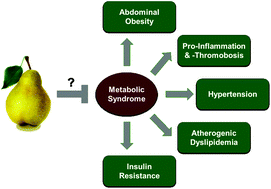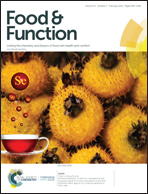Influence of daily fresh pear consumption on biomarkers of cardiometabolic health in middle-aged/older adults with metabolic syndrome: a randomized controlled trial
Abstract
Previous research suggests potential for fresh pears as a functional food for promoting cardiometabolic health. The purpose of this randomized, open-label, placebo-controlled, crossover clinical trial was to evaluate the influence of daily fresh pear consumption on blood pressure (primary outcome) and other biomarkers of cardiometabolic health in middle-aged/older adults with metabolic syndrome (MetS). Forty men and women aged 45–65 years with MetS were included and randomly assigned to receive either two medium-sized fresh pears (Pear) or a calorie-matched control drink (Control) per day for each 12-week treatment period, each separated by a 4-week washout period. After 12 weeks of daily fresh pear consumption, systolic blood pressure tended to be reduced (130 ± 2 mmHg vs. 134 ± 2 mmHg at baseline, P = 0.07) and pulse pressure was significantly reduced (51 ± 1 vs. 54 ± 1 at baseline, P < 0.05). At 12 weeks, leptin concentrations were lower in the Pear group than Control (52.5 [7.6, 120.5] ng dL−1vs. 53.4 [5.0, 120.5] ng dL−1, respectively, P < 0.05), and there was a significant group by time interaction (P < 0.05). Leptin concentrations were significantly reduced at 12 weeks compared to baseline in the Pear group (52.5 [7.6, 120.5] ng dL−1vs. 54.8 [6.4, 120.5] ng dL−1 at baseline, P < 0.05) but not in the Control group. Waist circumference was significantly reduced at 12 weeks in the Pear group (107.7 ± 2.0 cm vs. 108.4 ± 2 cm at baseline, P < 0.05) with a trend for a group by time interaction (P < 0.1), and significantly lower in the Pear group than Control (108.1 ± 2.0 cm vs. 108.8 ± 2 cm, P < 0.05) at 6 weeks with a significant group by time interaction (P < 0.05). Conversely, values were significantly increased at 6 weeks (108.8 ± 2 cm vs. 108.3 ± 2.0 cm at baseline, P < 0.05) in the Control group and sustained at 12 weeks. Waist-to-hip ratio was significantly reduced (0.92 ± 0.01 vs. 0.93 ± 0.01 at baseline, P < 0.05) at 12 weeks in the Pear group, and significantly lower than Control at 6 weeks (0.93 ± 0.01 vs. 0.93 ± 0.01, respectively, P < 0.05) and 12 weeks (0.92 ± 0.01 vs. 0.93 ± 0.01, P < 0.05). These findings suggest that daily fresh pear consumption may promote modest improvements in cardiometabolic health in middle-aged/older adults with MetS. This trial was registered at clinicaltrials.gov as NCT02228837.



 Please wait while we load your content...
Please wait while we load your content...